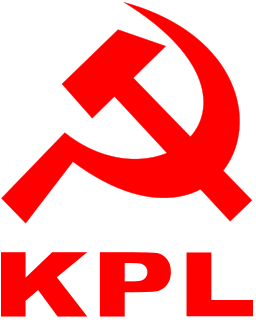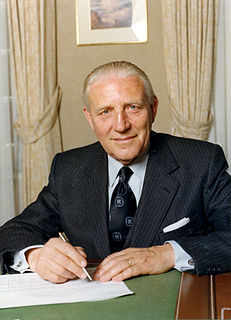The politics of Luxembourg takes place in a framework of a parliamentary representative democratic monarchy, whereby the Prime Minister of Luxembourg is the head of government, and the multi-party system. Executive power is under the constitution of 1868, as amended, exercised by the government, by the Grand Duke and the Council of Government (cabinet), which consists of a prime minister and several other ministers. Usually, the prime minister is the leader of the political party or coalition of parties having the most seats in parliament. Legislative power is vested in both the government and parliament. The judiciary is independent of the executive and the legislature.

The Left is a democratic socialist political party in Luxembourg.

The Luxembourg Socialist Workers' Party, abbreviated to LSAP or POSL, is a social-democratic, pro-European political party in Luxembourg.

The Greens is a green political party in Luxembourg.

Lydie Polfer is a Luxembourgish politician who has served in a number of capacities, including Deputy Prime Minister, Minister for Foreign Affairs, and Mayor of Luxembourg City, as well as a Member of the European Parliament (MEP) and a member of the Chamber of Deputies. She is a member of the Democratic Party (DP).
The German occupation of Luxembourg in World War II began in May 1940 after the Grand Duchy of Luxembourg was invaded by Nazi Germany. Although Luxembourg was officially neutral, it was situated at a strategic point at the end of the French Maginot Line. On 10 May 1940, the German Wehrmacht invaded Luxembourg, Belgium and the Netherlands. Luxembourg was initially placed under a military administration, but later became a civilly administrated territory and finally was annexed directly into Germany. The Germans believed Luxembourg to be a Germanic state, and attempted to suppress what they perceived as alien French language and cultural influences. Although some Luxembourgers joined the resistance or collaborated with the Germans, both constituted a minority of the population. As German nationals, from 1942, many Luxembourgers were conscripted into the German military. Nearly 3,500 Luxembourgish Jews were murdered during the Holocaust. The liberation of the country by the Allies began in September 1944, but due to the Ardennes Offensive it was not completed until early 1945.
Elections in Luxembourg are held to determine the political composition of the representative institutions of the Grand Duchy of Luxembourg. Luxembourg is a liberal representative democracy, with universal suffrage guaranteed under the constitution. Elections are held regularly, and are considered to be fair and free.

The Communist Party of Luxembourg is a communist party in Luxembourg. Ali Ruckert is the current chairman of the party.

The Alternative Democratic Reform Party is a conservative and mildly populist political party in Luxembourg. It has four seats in the sixty-seat Chamber of Deputies, making it the fifth-largest party.

Claude Wiseler is a Luxembourgish politician. He has been a member of the Christian Social People's Party (CSV) since 1983, and served in the government led by Jean-Claude Juncker until 2013.

The Chamber of Deputies, abbreviated to the Chamber, is the unicameral national legislature of Luxembourg. Krautmaart is sometimes used as a metonym for the Chamber, after the square on which the Hôtel de la Chambre is located.
The Party of the Third Age was a political party in Luxembourg. It contested the 1999 election to the Chamber of Deputies, but has since disbanded.

The German occupation of Luxembourg during World War I was the first of two military occupations of the Grand Duchy of Luxembourg by Germany in the 20th century. From August 1914 until the end of World War I on 11 November 1918, Luxembourg was under full occupation by the German Empire. The German government justified the occupation by citing the need to support their armies in neighbouring France, although many Luxembourgers, contemporary and present, have interpreted German actions otherwise.

The first Juncker–Asselborn Ministry was the government of Luxembourg between 31 July 2004 and 23 July 2009. It was led by, and named after, Prime Minister Jean-Claude Juncker and Deputy Prime Minister Jean Asselborn.

The Juncker–Polfer Ministry was the government of Luxembourg between 7 August 1999 and 31 July 2004. It was led by, and named after, Prime Minister Jean-Claude Juncker and Deputy Prime Minister Lydie Polfer.

The Werner-Thorn Ministry was the government of Luxembourg between 16 July 1979 and 20 July 1984.
The Werner-Cravatte Ministry was the government of Luxembourg between 15 July 1964 and 6 February 1969. Throughout the ministry, the Deputy Prime Minister was Henry Cravatte, replacing Eugène Schaus, who had been Deputy Prime Minister in the first Werner-Schaus Ministry. It was a coalition between the Christian Social People's Party (CSV), and the Luxembourg Socialist Workers' Party (LSAP).
The Dupong-Bodson Ministry was the government of Luxembourg between 3 July 1951 and 23 December 1953. It was a coalition between the Christian Social People's Party (CSV), and the Luxembourg Socialist Workers' Party (LSAP). It was formed after the general election of 1951.
The Reuter Ministry was the government in office in Luxembourg from 28 September 1918 until 20 March 1925. It resulted from the Chamber elections of 28 July and 4 August 1918 and was reshuffled on 5 January 1920 as a result of the elections of 26 October 1919. There was a further reshuffle on 15 April 1921, when the Liberals left the government.
The Left Bloc was a political alliance in the Chamber of Deputies of Luxembourg at the beginning of the 20th century. The "marriage of convenience" between the Social Democratic Party and the Liberal League was formed in 1908.










